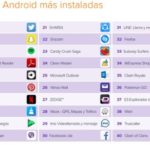The Android apps that drain the most battery, data and memory
Is your smartphone’s performance sluggish? Storage full? Battery dead in just a few hours? Always running out of data? If you can’t find the answer to these, or similar, questions, this article will shed some light and help you improve the performance of your Android handset. Security software firm Avast recently released its quarterly report, which ranks the top battery-draining, storage-hogging, and mobile-data-eating apps.

You shouldn’t stop using these apps altogether. But it's always good to be aware of which ones drain your smartphone resources - that consume the most battery, data (when not connected to a Wi-Fi network), or storage space.
The report, which is based on “a sample of aggregated and anonymized data from more than three million Android users around the globe,” aims to detect the top performance-draining apps on your device. Some of these come preinstalled in smartphones, while others are simply among the most popular.

The best way to solve and improve your handset's performance is to, according to Avast, "uninstall or stop the applications you don’t use.” This is the first action aimed at improving your smartphone’s performance.
Top data-hogging apps
Certain applications consume high volumes of data, even when not in use. These apps keep running in the background, even if the user is not aware of it. The top data-eating apps in this category include Facebook, Instagram, Firefox or WhatsApp.
The solution? "These applications can be disabled or have their background processing permits revoked to optimize the use of the data plan when not connected to a Wi-Fi network,” says the technology firm.
The most-downloaded apps
Regarding the most popular android applications, it is worth noting that AliExpress has broken into the Top-50. This application allows users to shop from a broad range of suppliers from across the world. Once again, Microsoft Word and Microsoft Outlook appear on the list, reaffirming their dominance among the most popular text and email editing tools.
